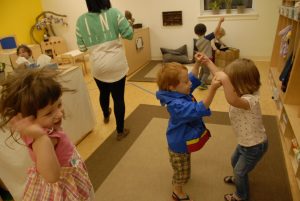Toddlers and Sharing
Social emotional learning is at the base of every experience in a toddler’s life. As they learn about themselves as separate entities from caregivers and loved ones, they explore their place in the world, test out strategies for getting their needs met and become curious about their peers. At the same time, the child also copes with the ongoing struggle between establishing independence while still feeling loved and supported.
This process often manifests itself into behaviors and emotional outbursts that seem irrational to the adult eye. One moment your child is an angelic snuggle monster and the next, due to a seemingly insignificant occurrence, their behavior seems to escalate to monstrous proportion. What is important to remember is that they do not yet possess the skills needed to regulate emotions and cope with stress. That seemingly insignificant occurrence may have defied their expectations, broken them out of a comforting routine or simply made them upset. These moments are perfect opportunities to gently practice and introduce new social emotional skills. By being present and patient, introducing language to label emotions, acknowledging their feeling, and offering concrete and limited choices/ solutions, you set them up for a lifetime of social emotional success.
As children enter school, their social world broadens and they learn that they must now share space, materials and adult attention with a group of children. At this stage, it is only natural that they begin to want to establish dominance over possessions (and sometimes people). The word “mine” becomes all too familiar and playdates may take on a vague resemblance to the Hunger Games. Pushing, hitting and sometimes biting become the child’s natural and immediate response to a stressful situation. Most often this is a developmentally appropriate coping strategy that should too be used as a learning opportunity. The focus of the adult intervention should always be about the hurt feelings or body of the other child, followed by how the child in question may be feeling and a suggested set of solutions to the problem. Older children who have a bit more language can pose their own solutions and negotiate the terms of their play. Give them time to work it out, but stay close by in case the response again becomes a physical one. Do not shame or punish the child but cut the playdate or social interaction short if it proves to be too difficult for your child. Other parents will understand. They have all been there!
Toddlers do not and cannot share. While “sharing” is often a common mantra for parents and educators alike, it is not a developmentally appropriate concept for a young child. The child quickly learns that being asked to share means forfeiting an object that they feel is rightfully theirs. When there are enough toys to go around, ask the child “which one can ____ have?” There will be less resistance if they decide which toys are not instrumental to their work. If there is a toy that does not have a duplicate, it is important to respect the child’s need for the object at that moment and model the language of turn taking. At BKSB we commonly model the phrases “Can I have that?” “I am working with it” and “Please give it to me when you are finished”. When a child sets down a toy, ask if they are finished and remind them to pass it along. When they do so, praise the child for their thoughtful actions and point out its effects i.e. Look they’re smiling! You made them so happy.”
In the words of Tovah Klein from her book How Toddlers Thrive: What Parents Can Do Today for Children Ages 2-5 to Plant the Seeds of Lifelong Success, “Before a child can be genuinely altruistic and be able to include others in what they have, they must feel deep inside that their own needs are met (p. 214)” Self-advocacy plays an important role in empathy building and perspective taking and therefore should serve as a foundational basis for social emotional learning


